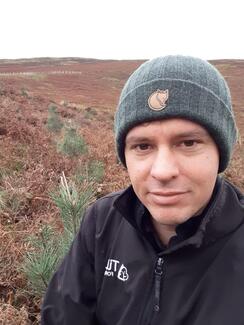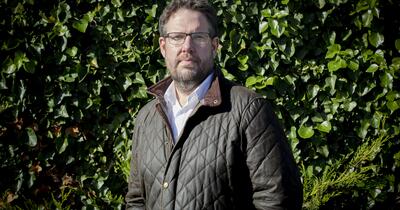
Scottish forestry manager Byron Braithwaite NSch 2023 has published his Nuffield Farming report ‘Creating Forests That Thrive in a Changing Climate: Drought and Fire Resilience’, sponsored by the John Oldacre Foundation.
The full report is now available on the Nuffield Farming report library and his report video is available on the Nuffield Farming YouTube channel. Byron will present the findings of his research at the 2024 Nuffield Farming Conference in Belfast.
During his Scholarship, Byron travelled to Canada, France, Spain and New Zealand. He aimed to observe forests in drier climates to identify techniques which increase the resilience of young trees to drought and determine the best practices for fire management. He says, “This report examines key areas for building resilience in UK forestry practices in the face of climate change. It focuses on drought tolerance and fire management strategies, on which there is currently only limited work underway to address these issues.”
On drought tolerance and resilience, he says: “A critical factor for long-term resilience is tree breeding for drought tolerance and diversification of species. However, current funding for public and private breeding programmes, particularly for native broadleaf trees, is insufficient. Implementing a government levy on timber sales, similar to the French model, could provide a sustainable funding mechanism.”
Byron also explores the importance of optimising planting and cultivation, large-scale data collection for genotype, site-specific planting assessment, and the potential of mycorrhizal fungi to enhance nutrient and moisture uptake.
On fire management and resilience, he says: “Given the fragmented mixed land use environment in the UK, the risk of large-scale wildfires is lower compared to other regions of the world. However, targeted vegetation control in high-public use areas, around critical infrastructure, and near sensitive ecological areas remains critical. Controlled grazing, low-intensity fires, and mechanical methods can be effective tools for managing fuel loads without compromising biodiversity.
“Public awareness and responsible behaviour are crucial for mitigating fire risk. Educational initiatives targeting children and outreach programmes for outdoor enthusiasts are recommended. Utilising social media and digital channels can broaden the reach of fire safety messaging.”
Byron concludes: “Continuous improvement in traditional forestry practices, increased investment in tree breeding for drought tolerance, and proactive fire management strategies are important in ensuring the long-term health and resilience of UK forests and our society as a whole.”
Study objectives
- Investigate the likely effects of drought and fire on the UK forest industry by observing forests in drier climates across the world.
- Identify techniques and practical measures to increase the resilience of young trees at the establishment phase.
- Determine best practice for fire management and community and landowner resilience and preparedness.
Messages
- Action to create drought and fire resilient forests must start immediately.
- Tree breeding, particularly for diverse conifer and productive broadleaf species, must be adequately funded through public and private sector investment to enable diversification.
- Wildfire is almost always started by humans. Cultural change must commence immediately to ensure that we are a fire aware nation in the future.
- Vegetation control to reduce fuel loads should be focused on high use public areas and important infrastructure or habitats.
- ENDS -



